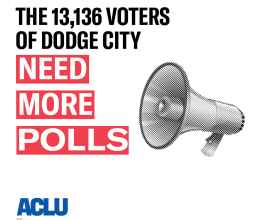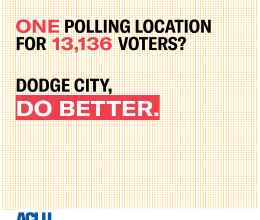
Voter suppression is a growing concern across the country. The latest goings-on in Georgia are a case in point with reports of two-hour waits to vote and a reduced number of polling locations.
Kansas, of course, has a long history with the perpetual-motion-machine that is Secretary of State Kris Kobach. He’s emerged as a champion of voter identification laws that have been cited as a primary factor in reducing turnout, often among Democratic constituencies across the country.
Now, Dodge City is under scrutiny for what appears to be a blatant bid to undercut the turnout in western Kansas’ Ford County.
On election day, Dodge City voters will convene in one — we’ll repeat that, just one — polling location, which will be at the expo center outside of town. It’s a new site because construction made the previous location inaccessible. But there are major problems: No public transportation serves the expo center. In fact, the nearest bus stop is more than a mile away. At times, freight trains block traffic, slowing access to the polls.
The single polling location will serve 13,136 voters, and that makes it one of the busiest polling sites in the state. The average polling location serves 1,200 voters.
“It’s limiting people’s rights to vote in the most fundamental way,” first-time voter Alejandro Rangel-Lopez told KSN News. “They just can’t make a quick trip to the polling booth.”
Debbie Cox, the county clerk who oversees voting is a Republican. She said the dearth of people willing to work at the polls and the difficulty of finding bilingual poll workers made the single site the obvious solution.
Kansas Elections Director Bryan Caskey has praised her, saying Cox sent out notices to every voter highlighting the new location.
The ACLU of Kansas, though, is hopping mad. The organization pointed out that it took a citizen’s complaint in 2017 to push Cox to notify residents of the new polling location and to offer free bus rides on Election Day.
Cox did not respond to an interview request from The Star.
The ACLU said Cox should have reached out to Dodge City Superintendent Fred Dierksen about using school buildings as polling locations. “We would’ve worked with them in any way we could’ve,” Dierksen told The Star.
Dodge City’s population is 60 percent Hispanic, and the voter turnout among Latinos is lower than the national average.
This week, Lyft, the ride-sharing service, announced that it will partner with a Latino activist group to get Dodge City voters to the polls. But even that service won’t be enough for everyone who needs transportation.
“Local officials in Ford County are willing to cheat to improve their party’s position,” said Jason Noble of Let America Vote, a group that pushes back against voting restrictions. “They’re taking us backwards to some of the ugliest periods of our history because they think it’ll help them win.”
This year’s post-election analysis almost certainly will focus on voter suppression tactics nationwide. Another one may be on display in Missouri, a state where Republicans have continually declined to pass advance voting. A complicated ballot combined with motivated bases in each party suggest that the lines will be long on Election Day. Discouraged voters may give up and go home.
If all this fuels new calls for reform, it should. One simple fix that should be at the top of the to-do list is adding more polling locations in Dodge City, Kansas.
